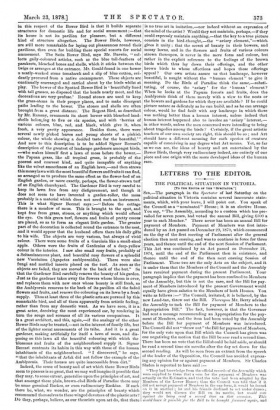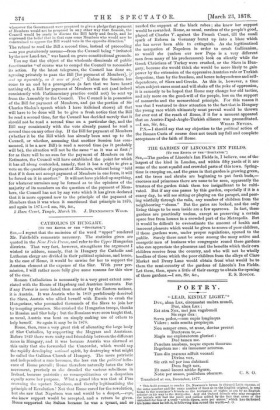LETTERS TO THE EDITOR.
THE POLITICAL SITUATION IN VICTORIA.
(To THE EDITOR OF THE ,,nrstrraroa.-1 SIR,—The paragraph in the Spectator of lasf Saturday on the
political situation in Victoria contains several inaccurate state- ments, which, with your leave, I will point out. You speak of the Council as a " nominated " House ; it is an elective House.
You say, " The Assembly, according to a custom which has pre- vailed for seven years, had voted the annual Bill, giving £300 a
year to each Member." There never has been an annual Bill for payment of Members. Payment of Members was first intro- duced by an Act passed on December 29, 1870, which commenced on the day of the first meeting of Parliament after the general election then next ensuing, and was to continue in force for three years, and thence until the end of the next Session of Parliament. This Act was continued by an Act passed on December 24, 1874, until the end of the Parliament then in existence, and thence until the end of the then next ensuing Session of Parliament. These two are the only Acts on the subject, and it is under them that the Members of the Council and the Assembly have received payment during the present Parliament. Your paragraph implies that the payment has been confined to Members of the Assembly, but this is not the case, and the Bill for pay- ment of Members introduced by the present Government would equally have given salaries to the Members of both Houses. You write as follows :—'"The Council, irritated, it is believed, by the
new Land-tax, threw out the Bill. Thereupon Mr. Berry advised the Assembly to tack the Bill for payment of Members to the Appropriation Bill." The fact, however, is that the Governor
had sent a message recommending an Appropriation for the pay- ment of Members, and the item had been voted by the Assembly before the Bill for payment of Members was introduced.
The Council did not "throw out" the Bill for payment of Members, for the only vote upon that Bill which the Council has given was one negativing the motion that the Bill be now read a second time.
There has been no vote that the Bill should be laid aside, or should be read a second time six months after the day set down for the second reading. As will be seen from an extract from the speech of the leader of the Opposition, the Council has avoided express- ing any opinion for or against payment of Members. Sir Charles Sladen is reported to have said :-
"They had knowledge from the official records of the Assembly which were supplied to them that a sum for the payment of Members was actually on the Estimates, and that the vote had been adopted by the Members of the Lower House ; thus the Council was told that if it did not accept payment of Members in the one form, it would bo forced on it in another ; ho and his friends declined to act under duress; they would not discuss the Bill on its merits, but would vote
against its being read a second time on that occasion. This would leave it possible for the Bill to be brought forward again, and whenever the Government wore prepared to give a pledge that payment of Members would not be proposed in any other way that Session, the Council would be ready to discuss the Bill fairly and freely, and he expressed the belief that in that case some Members who would now be constrained to oppose tho Bill would vote in the opposite direction."
The refusal to read the Bill a second time, instead of proceeding —as you gratuitously assume—from the Council being " irritated by the new Land-tax," was based on grave constitutional grounds.
You say that the object of the wholesale dismissals of public functionaries "of course was to compel the Council to reconsider its action. By the latest telegrams, the Council has done so, agreeing privately to pass the Bill [for payment of Members], if xent up separately, as it was at first." Unless the Session has come to an end by a prorogation (a fact that we have heard nothing of), a Bill for payment of Members will not (and indeed consistently with Parliamentary practice could not) be sent up from the Assembly to the Council. The Council is in possession of the Bill for payment of Members, and (as the portion of Sir Charles Sladen's speech which I have italicised shows) all that will have to be done will be to give a fresh notice that the Bill be read a second time, for the Council has decided merely that it should not be read a second time on a particular day, and the Bill may consistently with the vote already passed be read a second time on any other day. If the Bill for payment of Members (whether it be the Bill which has already been sent up to the Council, or whether, assuming that another Session has com- menced, it be a new Bill) is read a second time (as it probably will be), the situation will not be the same " as it was at first ;" for as there will be no sum for the payment of Members on the Estimates, the Council will have established the point for which it has all along contended, namely, that it has a right to give a vote on the question of payment of Members, without being " told that if it does not accept payment of Members in one form, it will be forced on it in another." It will not have yielded up anything, for whatever surmises may be formed as to the opinions of the majority of its members on the question of the payment of Mem- bers, the Council has not by any vote which it has given declared that it is more opposed now to the principle of the payment of Members than it was when it sanctioned that principle in 1870, and again in 1874.—I am, Sir, &c., 2 Rare Court, Temple, March 18. J. DENNISTOUN WOOD.



































 Previous page
Previous page